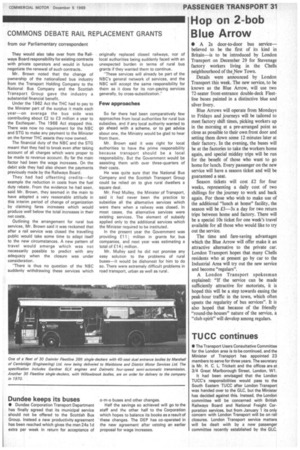COMMONS DEBATE RAIL REPLACEMENT GRANTS
Page 33

If you've noticed an error in this article please click here to report it so we can fix it.
from our Parliamentary correspondent
They would also take over from the Railways Board responsibility for existing contracts with private operators and would in future negotiate the renewal of such contracts.
Mr. Brown noted that the change of ownership of the nationalized bus industry from the Transport Holding Company to the National Bus Company and the Scottish Transport Group gave the industry a substantial financial benefit.
Under the 1962 Act the THC had to pay to the Minister part of the surplus it made each year--on average the bus side was contributing about £2 to £3 million a year to the Exchequer. The 1968 Act stopped this. There was now no requirement for the NBC and STG to make any payment to the Minister on the former THC assets they now owned.
The financial duty of the NBC and the STG meant that they had to break even after taking account of all charges which were proper to be made to revenue account. By far the main factor had been the wage increases. On the debit side they had also shown the payments previously made by the Railways Board.
They had had offsetting credits--for example the reduction in costs from the fuel duty rebate. From the evidence he had seen, said Mr. Brown, they seemed in the main to have adopted a very reasonable attitude in this interim period of change of organization by claiming fares increases which would produce well below the total increases in their net costs.
Outlining the arrangement for rural bus services, Mr. Brown said it was reckoned that after a rail service was closed the travelling public would take some time to adapt itself to the new circumstances. A new pattern of travel would emerge which was not necessarily possible to predict with any adequacy when the closure was under consideration.
"There is thus no question of the NBC suddenly withdrawing these services which originally replaced closed railways, nor of local authorities being suddenly faced with an unexpected burden in terms of rural bus grants if they wanted them to continue.
"These services will already be part of the NBC's general network of services, and the NBC will accept the same responsibility for them as it does for its non-Raying services generally, by cross-subsidization."
Few approaches
So far there had been comparatively few approaches from local authorities for rural bus subsidies, and if any local authority wanted to go ahead with a scheme, or to get advice about one, the Ministry would be glad to hear from them.
Mr. Brown said it was right for local authorities to have the prime responsibility because transport should be a local responsibility. But the Government would be assisting them with over three-quarters of their costs.
He was quite sure that the National Bus Company and the Scottish Transport Group could be relied on to give rural dwellers a square deal.
Mr. Fred MuIley, the Minister of Transport, said it had never been the practice to subsidize all the alternative services which were there when a railway was closed. In most cases, the alternative services were existing services. The element of subsidy applied only to the additional services which the Minister required to be instituted.
In the present year the Government was providing £111 million in grants for bus companies, and next year was estimating a total of £14f million.
Mr. Mulley said he did not promise any easy solution to the problems of rural buses—it would be dishonest for him to do so. There were extremely difficult problems in road transport, urban as well as rural.






















































































































































